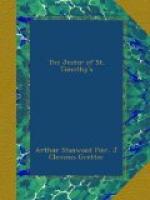“I’ll hold no argument with you,” cried Irving; in his excitement his voice rose thin and thrill. “Leave the room at once.”
Westby laid the pointer and the chalk on the shelf, blew the dust from his fingers, and walked towards his seat. Irving took a step forward; his face was white.
“What do you mean!—What do you mean! I told you to leave the room.”
Westby faced him with composure through which showed a sneer; for the first time the boy was displaying contempt; hitherto his attitude had been jocose and cajoling.
“I was going for my cap,” he said, and his eyes flashed scornfully. Then, regardless of the master’s look, he continued past the row of his classmates, took up his cap, and retraced his steps towards the door. Irving stood watching him, with lips compressed in a stern line; the line thinned even more when he saw Westby bestow on his friends a droll, drooping wink of the left eyelid.
And then, while all the class sat in silence, Westby did an audacious thing—a thing that set every one except Irving off into a joyous titter. He went out of the door doing the sailor’s hornpipe,—right hand on stomach, left hand on back, left hand on stomach, right hand on back, and taking little skips as he alternated the position. And so, skipping merrily, he disappeared down the corridor.
Irving returned to his platform. His hands were trembling, and he felt weak. When he spoke, he hardly knew his own voice. But he struggled to control it, and said,—
“Scarborough, please go to the board and demonstrate your theorem.”
There was no more disorder in class that day; in fact, after Westby’s disappearance the boys were exceptionally well behaved. Slowly Irving recovered his composure, yet the ordeal left him feeling as if he wanted to shut himself up in his room and lie down. He knew that he had lost command of his temper; he regretted the manner in which he had stormed at Westby; but he thought nevertheless that the treatment had been effective and therefore not entirely to be deplored. The boys had thought him soft; he had shown them that he was not; and he determined that from this time forth he would bear down upon them hard. If by showing them amiability and kindliness he had failed to win their respect, he would now compel it by ferocity. He would henceforth show no quarter to any malefactor.
Walking up to his room, he fell in with Barclay, who was also returning from a class.
“What is the extreme penalty one can inflict on a boy who misbehaves?” he asked.
“For a single act?” asked Barclay.
“For one that’s a climax of others—insolence, disobedience, disorder—all heaped into one.”
Irving spoke hotly, and Barclay glanced at him with a sympathetic interest.
“Well,” said Barclay, “three sheets and six marks off in decorum is about the limit. After that happens to a boy two or three times, the rector is likely to take a hand.—If you don’t mind my saying it, though—in my opinion it’s a mistake to start in by being extreme.”




